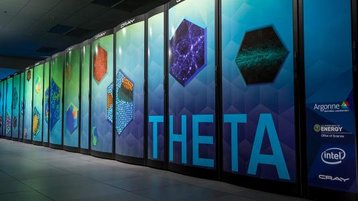The US Department of Energy’s (DOE) Argonne National Laboratory in Lemont, Illinois, has retired its Theta supercomputer.
The company announced late last month that the high-performance computer would cease operations by the end of 2023.
Launched in July 2017, the machine delivered 202 million compute hours to more than 600 projects, including Covid-19 research and climate & energy science.
The Cray XC40 system featured Intel Xeon Phi processors and offered 6.92 petaflops (11.66 petaflops peak) of performance. The system peaked at 16th on the Top500 list of most powerful supercomputers – it ranked 112th in November 2023.
A GPU hardware expansion, known as ThetaGPU, was added in 2020. After Theta’s retirement at the end of the year, the ThetaGPU hardware will be repurposed to create a new machine called Sophia.
“Theta was a pivotal system for science at Argonne and beyond,” said Michael Papka, director of the Argonne Leadership Computing Facility (ALCF). “Not only did Theta deliver on our mission to enable large-scale computational science campaigns, but it was also the supercomputer that continued our transformation into a user facility that supports machine learning and data science methods alongside more traditional modeling and simulation projects.”
Argonne Labs is also home to the Aurora, Polaris, and Cooley supercomputers, while its testbed service offers access to hardware from the likes of SambaNova, Groq, Cerebras, and Graphcore.







